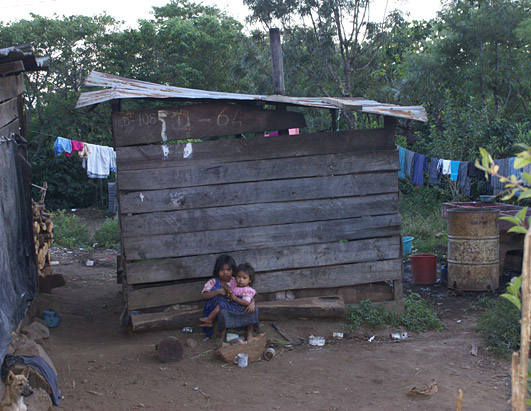Section 1: The Magnitude, Character and Perceptions of Poverty in Guatemala
Poverty in Guatemala is very high. In 2000, over half of all Guatemalans (nearly 60%, or about 6.4 million people lived in poverty.) Even though international comparisons of poverty are difficult due to various measurement differences, available evidence does suggest that poverty in Guatemala is higher than in other Central American countries. It is also generally deeper and more severe. More recent statistics indicate that the percentage of Guatemalans living in poverty has been rising and is now estimated at closer to 64% with slightly over 30% living in extreme poverty - a level where families are unable to obtain the minimum daily caloric intake of food.
About two/thirds of all Guatemalan children live in poverty. Due to higher fertility rates among the poor, 68% of children under the age of six and 63% of children under the age of 18 live below the poverty line. The “poverty line” being defined as the yearly cost of food necessary to meet minimum caloric requirements plus a small percentage of that basic food cost added for essential non-food items such as housing, health-care, education and clothing.Poverty is predominantly rural and extreme poverty is almost exclusively rural. Over 81% of the poor and 91% of the extreme poor live in the countryside. Three quarters of all rural residents fall below the poverty line.
Section 2:The Historical and Cultural Factors Contributing to Poverty in Guatemala:
Guatemala's high degree of poverty and exclusion did not emerge overnight. Factors, both historical and cultural, have fundamentally shaped Guatemala's current levels of poverty and economic disparity. There are two predominant contextual factors in the makeup of Guatemala as a country: its rich cultural diversity and its geographic isolation. Within this context have operated key exclusionary forces in Guatemala's historical pattern of development, including:

- Massive land expropriation from the indigenous population which has resulted in one of the most unequal distributions of land in the world;
- Official forced labor policies that exploited indigenous labor from the 1600's through the middle of the 1900's; and
- Human capital accumulation, which has historically suffered from exclusionary education policies as part of a broader economic and political strategy, and as an outcome of the exclusionary land and labor policies.
Section 3. Education and Human Capital
Throughout much of its history, education in Guatemala has been traditionally reserved for “citizens,” a status not fully extended to women or indigenous until 1945. The liberal government of 1871 instituted a substantial educational reform (for its time), shifting responsibility for providing education from the Catholic Church to the state, and making education free and “mandatory” (but exclusively for ladino males.) The policy was not implemented, however, as the state lacked the necessary resources (teachers or funds, much like the situation at the present time.) With the temporary introduction of a more democratic state in 1945 came educational reform, including a literacy campaign, the creation of the Instituto Indigenista Nacional (National Indigenous School), and a policy to officialize indigenous languages. Further policy changes were legislated in 1985 under the National Education Law, which emphasized decentralization and the participation of indigenous communities in the education system. This was the first time that a law asserted that the education system should take into account Guatemala’s ethnic diversity.

Section 4. Guatemala Today and Into the Future
In many ways, Guatemala is better off than it was 25 years ago. However, there still remain many economic and social challenges to be addressed. While free-trade zones and “globalization” looked to be a path to economic development in the late 1990’s and early 2000’s, it has now become clear that those opportunities have moved on to more profitable low-cost production areas in Asia, thus leaving many empty factories and high unemployment in the urban areas (only 28% of Guatemalans actually have a steady job.) In addition, the promise of the development of NTAE’s (non-traditional agricultural exports) has also been shown to be environmentally damaging (because of the necessity for extensive chemical herbicide and fertilizer use) and economically costly and de-stabilizing (because it requires more capital than is generally available to the peasant farmer, thus causing him to lose his land when he is unable to cover start up costs for what looked to be a more “lucrative” crop.)

|
|
|

The poverty on the world is bad because that doesnt leave that the countries develope.
ResponderEliminarIt is sad to think of how our country is. :(
ResponderEliminarIt is sad that if we look to the right and if we look to the left, we can see how our country is, is very poor. We can make something to help those people that need it.
ResponderEliminarIt is sad seeing children in poverty
ResponderEliminari will like the goverment do something about that
ResponderEliminarFor our country is very important because is OUR country the thing that happen in our country can be bad for the poblation that can dead
ResponderEliminarpoverty in Guatemala ,,,For our country is very important because is OUR country the thing that happen in our country can be bad for the poblation that can dead
ResponderEliminarIt's really sad that only some people can enjoy good life and not at all good life. The majority live in poor , without opportunities. Day a day they seek the way to eat breakfast, lunch and dinner. We can help people that live the cruel reallity!
ResponderEliminarThe poverty in Guatemala is much looks and must do something to change to improve the country.
ResponderEliminari think that we have to help the people because if we are in their life i think that someones didnt help us and we are going to help them. I really like to discuss this topic. Good job Wendy!!! ;) And we have to help all the peolple no depending who are they..
ResponderEliminar